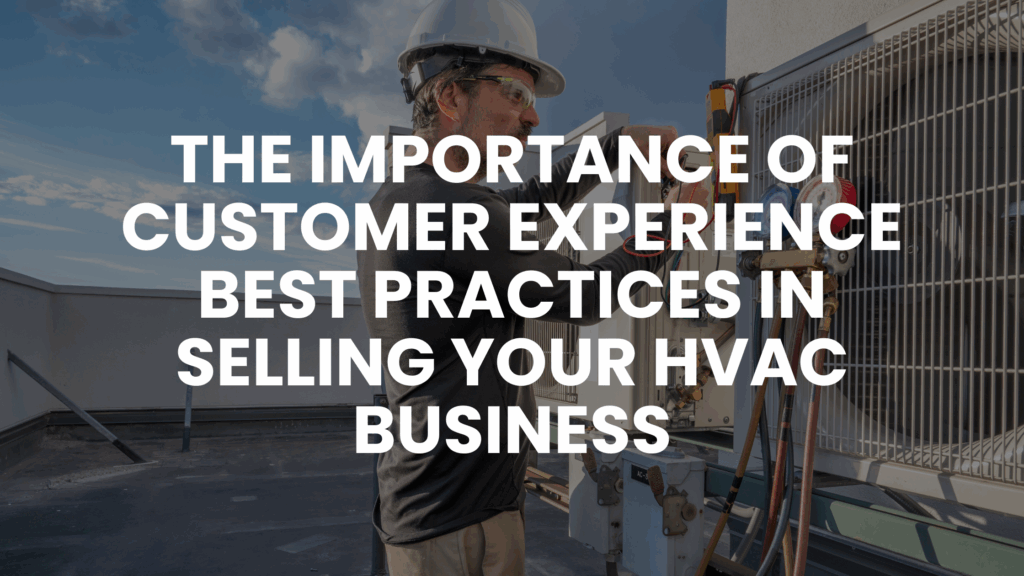Selling your HVAC business is a complex process, and to get the best price and terms, it’s crucial to highlight more than just your financials. One of the most valuable assets you can offer a potential buyer is the way you manage customer relationships. In today’s competitive market, customer experience best practices can make all the difference. By ensuring that your business is built on a foundation of strong customer service, you can increase its value and make it more attractive to buyers.
Why Customer Experience Best Practices Matter
When it comes time to sell your HVAC business, prospective buyers are not only interested in your revenue and profitability. They want to see the sustainability of your business, and one key factor that determines sustainability is customer loyalty. A business that excels in customer experience is one that retains loyal clients, generates repeat business, and receives positive referrals. These are qualities that investors value, as they provide long-term growth opportunities.
Customer experience best practices reflect a commitment to delivering high-quality service at every touchpoint with clients. By focusing on these practices, you signal to potential buyers that your business has a loyal customer base and is well-positioned for future success. It’s a way of ensuring that the hard work you’ve put into building your HVAC company continues to pay off after the sale.

Key Customer Experience Best Practices to Highlight
1. Consistent and High-Quality Service
One of the most important customer experience best practices is ensuring that your service is consistently top-notch. Buyers want to see that your business can deliver excellent results time and time again. Maintaining high standards in both technical expertise and customer service is essential. By demonstrating that you have systems in place to ensure consistent quality—whether through employee training, quality control procedures, or performance evaluations—you show potential buyers that your business can continue to operate smoothly under new ownership.
2. Effective Customer Feedback Systems
A key part of customer experience best practices is actively listening to your customers. Implementing systems to gather and act on customer feedback allows you to improve service and build stronger relationships. Tools like surveys, online reviews, or direct outreach can help you gauge customer satisfaction and identify areas for improvement. Buyers will appreciate seeing that your HVAC business is proactive in addressing customer needs and adapting to changing market demands.
3. Personalization of Services
In today’s competitive HVAC industry, personalized service can set you apart. Customers appreciate businesses that remember their preferences, offer tailored solutions, and anticipate their needs. Whether it’s sending reminders for routine maintenance, offering customized service plans, or making clients feel valued through personal communication, a customer-first approach adds significant value to your business. This kind of personalized service leads to stronger customer retention and can increase the overall worth of your business.
4. Leveraging Technology for Better Experience
Investing in customer experience best practices often involves leveraging technology to streamline operations and improve communication. From online booking systems to automated maintenance reminders and customer service chatbots, technology plays a crucial role in enhancing convenience and satisfaction. Buyers will recognize the value of a tech-savvy business, and these innovations can be a compelling selling point.
5. Customer Retention Strategies
Sustained customer loyalty is a direct result of excellent customer experience. Building a strategy for customer retention—whether through loyalty programs, service contracts, or exceptional post-service follow-up—shows that your business is designed to keep customers coming back. Buyers are more likely to pay a premium for a business that has a high customer retention rate, as it indicates a steady stream of future revenue.
Demonstrating the Value of Customer Experience Best Practices in Your Sale
When you’re ready to sell your HVAC business, it’s essential to showcase the success of your customer experience best practices. Include metrics such as customer satisfaction scores, retention rates, and any testimonials or reviews that highlight your business’s commitment to customer service. Potential buyers will be more inclined to invest in a business that has a proven track record of strong customer relationships.
Conclusion
Customer experience best practices are not just a way to enhance your business operations; they are also a key selling point when it comes time to sell your HVAC business. By focusing on delivering consistent, high-quality service, gathering customer feedback, personalizing services, leveraging technology, and retaining loyal customers, you can significantly increase your business’s value. This focus on customer satisfaction will help ensure that your HVAC business is in high demand and can command the best price and terms during the sale.
If you need additional support preparing your HVAC business to sell or would like to sell now, text or call Scale or Exit Partners at (832)745-2721. You can also email us at garyd@scaleorexit.com.
For more information on how Scale or Exit Partners can help you prepare for the sale, visit our website at www.scaleorexit.com. We have access to investors who are ready to buy now, and we can help you get your business ready to sell at the best price and terms for the future.
